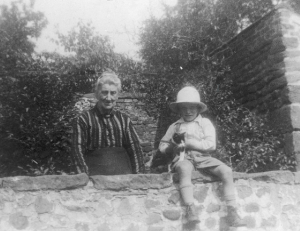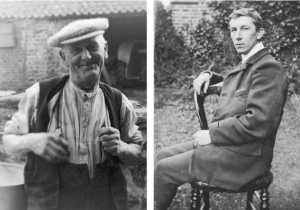 I am not a farmer any more but I used to be. It was farming that brought my great grandmother Elizabeth and her son William to Thornton Le Moor in 1879 when she bought Ivy House Farm. William inherited the farm and had three sons whose lives took a different course. I am not a farmer any more but I used to be. It was farming that brought my great grandmother Elizabeth and her son William to Thornton Le Moor in 1879 when she bought Ivy House Farm. William inherited the farm and had three sons whose lives took a different course.
The oldest, Uncle Will was born in 1888 and died of T.B. when he was only twenty-two so I never knew him. He spent the last year of his life in an isolation hut at the bottom of our front garden looked after by my grandmother Mary Anne.
Dad, John Henderson, was born in 1890. He ran the farm when he was older helped by the youngest son Edwin, who became quite a character and is still remembered by many of today's village folk. He was a butcher by trade. Following dad's death in 1938 when I was only seven, Edwin ran things but Mary Anne was still the boss.
At the time we had a mixed farm of sixty acres in the village and another thirty-four down Endican Lane towards the railway. That was about average for round here. It was mainly pasture; we had sheep, pigs, dairy cattle and chickens but we did some arable. We sold milk in the village and the rest went to churn for cream and butter. Tuesday was butter day, when we made the pounds with butter boards. Edwin took the butter and eggs to Northallerton market by bus and we took fat lambs and pigs on a Rulley Cart to the livestock marts at Malpass Road and the Station. We used horses then; very few people had cars. Mrs Parkinson, the vicar's daughter who lived at Fairview had one. She once took me to Curry's at Great Smeaton to see a milking machine when I was about eight. Mrs. Parkinson must have been seventy at the time. Eventually Cow and Gate Dairies took over running the milk, when things became organised in the Sixties.
With my dad dying fairly young, it was difficult at home at times, particularly during the war. At one point we had grandma Mary Anne, my mother Matilda, Edwin, sister Betty, myself and two twin sisters, Elizabeth and Margaret Newton, evacuees from Gateshead, at Ivy House. Then we got Mrs Wood and her young son from Gateshead as well, supposedly to help out, but things didn't work out between Mary Anne and Mrs Wood, so she left. Then Mary Anne took a bad turn, like some older people do and her mind wandered. She died in 1943. My mother, Matilda followed in 1962 twenty-four years after dad.
Sister Betty went to live with our other grandma, at Stillington, where she went to college in York and eventually married. When she died in 1969 it signalled the end of the farm. Edwin had a half share of the farm and Betty and me had a quarter share each. Betty's husband inherited her share, so we had to sell off the land to keep the house. We had no option.
I had married Audrey by then, we met in the Black Swan; Jill was five and Nick just a baby and it was then I stopped being a farmer. I got a job driving haulage lorries for Laurie Barker and then in the late eighties for A5 Hydraulics where Nick now works. Some people only know me as a driver.
My greatest interest is still farming and farming machinery, which I still maintain and operate at shows. It's a pity to see Holme Farm go. I worked there for Austin Bosomworth in 1945 and knew Hutchinsons and Carters before them. It was Eric Hutchinson who got electrocuted and died when he was clipping cows udders with electric shears. Thornton Le Moor had its fair share of farming tragedies.
For all the ups and downs, if I had the money I wouldn't have left the village though. We're in a beautiful place, Northallerton just down the road and The Dales and Moors are next door. Who'd want to live in London?
|

 A young Bill Kitching with his
Grandmother Mary Anne circa 1937

 Brothers Edwin and William Kitching (seated),
born and raised in the village.
William died of T.B in 1910,whilst Edwin
never married and born on 4th July
remained independent for the rest of his life.
|
